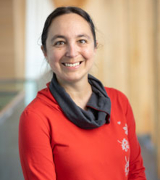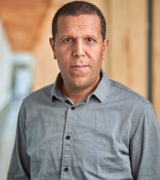The IAM training program team includes researchers in mathematics and industrial engineering (MAGI), mechanical engineering and chemical engineering from four institutions (Polytechnique Montréal, ETS, Université Laval and Université du Québec en Abitibi-Témiscamingue).
 Michel Gamache is the main applicant. He is a full professor in the Mathematics and Industrial Engineering (MAGI) department of Polytechnique Montreal.
Michel Gamache is the main applicant. He is a full professor in the Mathematics and Industrial Engineering (MAGI) department of Polytechnique Montreal.
He has a bachelor’s degree in mining engineering and a doctorate in applied mathematics, he has supervised 33 HQP over the past 6 years. His research interests focus on the planning, scheduling and optimization of mining operations. He currently co-supervises more than fifteen HQP on mining operations optimization, automation and mining equipment data analysis projects. He was named among ”Ten Names to Know in the Mining industry 2019 ” by the Canadian Institute of Mines and nominated and recipient of several merit awards for the quality of his teaching. He is a member of the Decision Analysis Study and Research Group (GERAD), of the Institute for Data Valorization (IVADO), of the Industries 4.0 Laboratory, of the Global Mining Guidelines Group and associate editor of the Optimization and Enginering.
He is involved in adaptive real-time management of mining operations, industrial data analysis and the development of digital twins projects.
 Bruno Agard is a full professor in the MAGI department.
Bruno Agard is a full professor in the MAGI department.
He heads the Data Intelligence Laboratory. His research focuses on the valuation of industrial data. Two of his projects focus on data analysis with the mining industry. He is the author of more than 100 scientific articles and co-founder and co-responsible for graduate studies of the ”Value Added Production” and ”Valorisation of industrial data” orientations. He is a member of the Interuniversity Research Center on Enterprise Networks, Logistics and Transport (CIRRELT), of the Mobility Chair, IVADO and of the editorial committee of the Journal of Intelligent Manufacturing. He has been nominated and recipient of several merit awards for the quality of his teaching.
 Jocelyn Bouchard is a full Professor in the Department of Chemical Engineering at Laval University.
Jocelyn Bouchard is a full Professor in the Department of Chemical Engineering at Laval University.
He held the Leadership Chair in Mineralurgical Engineering Education - Mines Agnico Eagle Ltee and ArcelorMittal Mines until 2017. Phenomenological modeling and simulation as well as control and optimization of mineral processing constitute his field of expertise. He was confered Visiting Scholar in the Automatic Control and Systems Engineering Department at the University of Sheffield in the UK in 2019-2020. His industrial collaborators include companies such as Nemaska Lithium, BBA, Mine Canadian Malartic, Corem, InnovExplo, Mines Agnico Eagle, Iamgold and CanmetMINES. In 2014, he was awarded the Bill Moore Award by the Canadian Ore Processing Company, which honors the exceptional contribution of a mineral processing professional under the age of 35. He has supervised 15 HQP over the past 6 years.
He will be involved in works on the digitization of the supply chain, more specifically on mineral processing.
 Li-Zhen Cheng is a professor and member of the Institute for Research in Mines and the Environment (IRME) and the Mineral Technology Research and Service Unit (URSTM) at UQAT.
Li-Zhen Cheng is a professor and member of the Institute for Research in Mines and the Environment (IRME) and the Mineral Technology Research and Service Unit (URSTM) at UQAT.
Her research interests focus on the development of tools for data processing to improve the signal/noise ratio on electromagnetic measurements in drilling, 3D modeling and inversion algorithms to translate geophysical anomalies into mineralization targets, and methods for automating resistivity measurements to assess the real-time and long-term performance of tailings pond covers.
She is associate editor for Exploration and Mining Journal and Arabian Journal of Geosciences. She has several international collaborations. In 2012 and 2013, she received the Barlow Memorial Medal (CIM), the Model of immigrants to Quebec (2012) and Member of the Circle of Excellence of the University of Quebec in 2014. She supervised 20 HQP over the past 6 years.
She will be involved in the work on the digitization of the logistics chain, more particularly on the geological aspects.
 Christophe Danjou, associate professor in the MAGI department, is an Industry 4.0 specialist.
Christophe Danjou, associate professor in the MAGI department, is an Industry 4.0 specialist.
He created the first course as well as the first micro-program in Industry 4.0 in Canada. This young professor has supervised more than 27 PHQ so far. He is one of the authors of the reference book on Industry 4.0 for the Ministry of the Economy and Innovation of the Government of Quebec.
He will be involved in the implementation projects of Industry 4.0 concepts in mining operations.
 Nathalie De Marcellis-Warin, full professor at Polytechnique Montréal in decision theory and industrial economics, President and CEO of the Center for interuniversity research and analysis of organizations (CIRANO), whose role is to contribute to the strategic decision-making of governmental, parapublic and private organizations through the production and transfer of high added value academic knowledge.
Nathalie De Marcellis-Warin, full professor at Polytechnique Montréal in decision theory and industrial economics, President and CEO of the Center for interuniversity research and analysis of organizations (CIRANO), whose role is to contribute to the strategic decision-making of governmental, parapublic and private organizations through the production and transfer of high added value academic knowledge.
She is principal researcher of the Innovation and Digital Transformation theme and co-manager of the CIRANO Pole on the socio-economic impacts of digital innovation and AI. She is also an associate researcher at the International Observatory on the Societal Impacts of AI and Digital Technology (OBVIA). She collaborates on major research projects with public and private organizations on the issues of emerging technology adoption and societal impacts. She has supervised more than 30 HQP over the past six years.
Her research interests in risk management and insurance, risk perception and social acceptability, public policy and regulation, economic analysis and cost-benefit analysis will be an asset to the socio-economic analysis of the technological transformations underway in mining.
 Isabelle Demers, full professor at UQAT, holds the Canada Research Chair in Integrating the Environment into the Life Cycle of a Mine.
Isabelle Demers, full professor at UQAT, holds the Canada Research Chair in Integrating the Environment into the Life Cycle of a Mine.
She is a member of IRME. She received the Emerging Talent Award in the natural sciences and engineering and health sciences sector from UQAT in the fall of 2018. She has supervised 23 HQP over the past six years.
Her expertise on the life cycle of a mine and the mining environment is essential for optimizing the mining supply chain.
 Jean-Marc Frayret is a full professor in the MAGI department at Polytechnique Montréal and director of the Poly-Industries 4.0 Laboratory.
Jean-Marc Frayret is a full professor in the MAGI department at Polytechnique Montréal and director of the Poly-Industries 4.0 Laboratory.
He received the Brockhouse Canada Prize for Interdisciplinary Research in Science and Engineering (NSERC, 2013) and is a guest editor for the special edition of the Journal of Industrial Ecology on Data Innovation in Industrial Ecology ( 2020) and associate editor of the Institution of Engineering and Technology Collaborative Intelligent Manufacturing Journal since 2018. He has supervised 37 HQP over the past 6 years and over 150 4th year undergraduate integration projects involving Canadian companies and non-profit organizations. He is a member of IVADO, CIRODD and CIRRELT. His research interests focus on distributed and collaborative manufacturing as well as the design and operation of industrial systems and complex value chains. The main approaches used are agent-based simulation, discrete event simulation and operations research.
He participates in the development of digital twins for mining.
 Hatem Mrad is a professor at UQAT and holds the Strategic Research Chair in Instrumentation 4.0 for intelligent prediction of mechanical failures in mining processes.
Hatem Mrad is a professor at UQAT and holds the Strategic Research Chair in Instrumentation 4.0 for intelligent prediction of mechanical failures in mining processes.
He has expertise in managing over forty industrial projects in partnership with Canadian and international companies and institutions such as Agnico Eagle, Hyperflo, Canex Alumiunm, Technosub, Vale, Norda Stelo and Glencore. He has supervised more than 32 HQPs over the past 6 years. He has several international collaborations with research teams from Tunisia, Egypt and France for projects funded by MRIF, MITACS and NSERC.
His research interests in the valorization of numerical data, the development of mechano-fiabilistic structural simulation approaches and intelligent failure prediction will be an asset for energy efficiency analysis, predictive maintenance and optimization of mining processes and structures.
 Robert Pellerin is a full professor at Polytechnique Montréal in the Department of Mathematics and Industrial Engineering.
Robert Pellerin is a full professor at Polytechnique Montréal in the Department of Mathematics and Industrial Engineering.
He holds the Jarislowsky/SNC-Lavalin Research Chair since 2010 and is a member of the CIRRELT and the Poly-Industries 4.0 laboratory. He has published more than a hundred scientific articles in international journals and has acted as a guest speaker on more than twenty occasions in several countries to discuss issues related to manufacturing execution systems and the adoption of practices associated with Industry 4.0. Prior to joining the Polytechnique Montréal, he led various reengineering and implementation projects for integrated management systems and manufacturing execution systems. His industrial and academic career has always been focused on the development of tools dedicated to the management and monitoring of operations. He was one of the first researchers in the world to take an interest in the real-time management of production systems by launching the Adaptive Manufacturing program in partnership with SAP in 2006. His research is still focused on these issues and he has conducted more than thirty research projects on the development and adoption of Industry 4.0 practices in various industrial sectors.
 Antoine Tahan is a full professor in the Department of Mechanical Engineering at ETS.
Antoine Tahan is a full professor in the Department of Mechanical Engineering at ETS.
He specializes in uncertainty modeling and propagation, metrology and decision making. His research projects include monitoring, diagnosis and prognosis and 3D metrology. Professor Tahan has directed and collaborated on several research projects (e.g., CRIAQ MANU501, MANU602 and MANU710, CARIC MANU1525 and MANU1707). Since 2005, in collaboration with the Hydro-Quebec Research Institute, he has supervised research work on issues related to damage modeling and the residual reliability of complex equipment. He has supervised 60 HQP over the past 6 years.
He will work on preventive and predictive maintenance of mining equipment which is a major research area for the mining industry.


